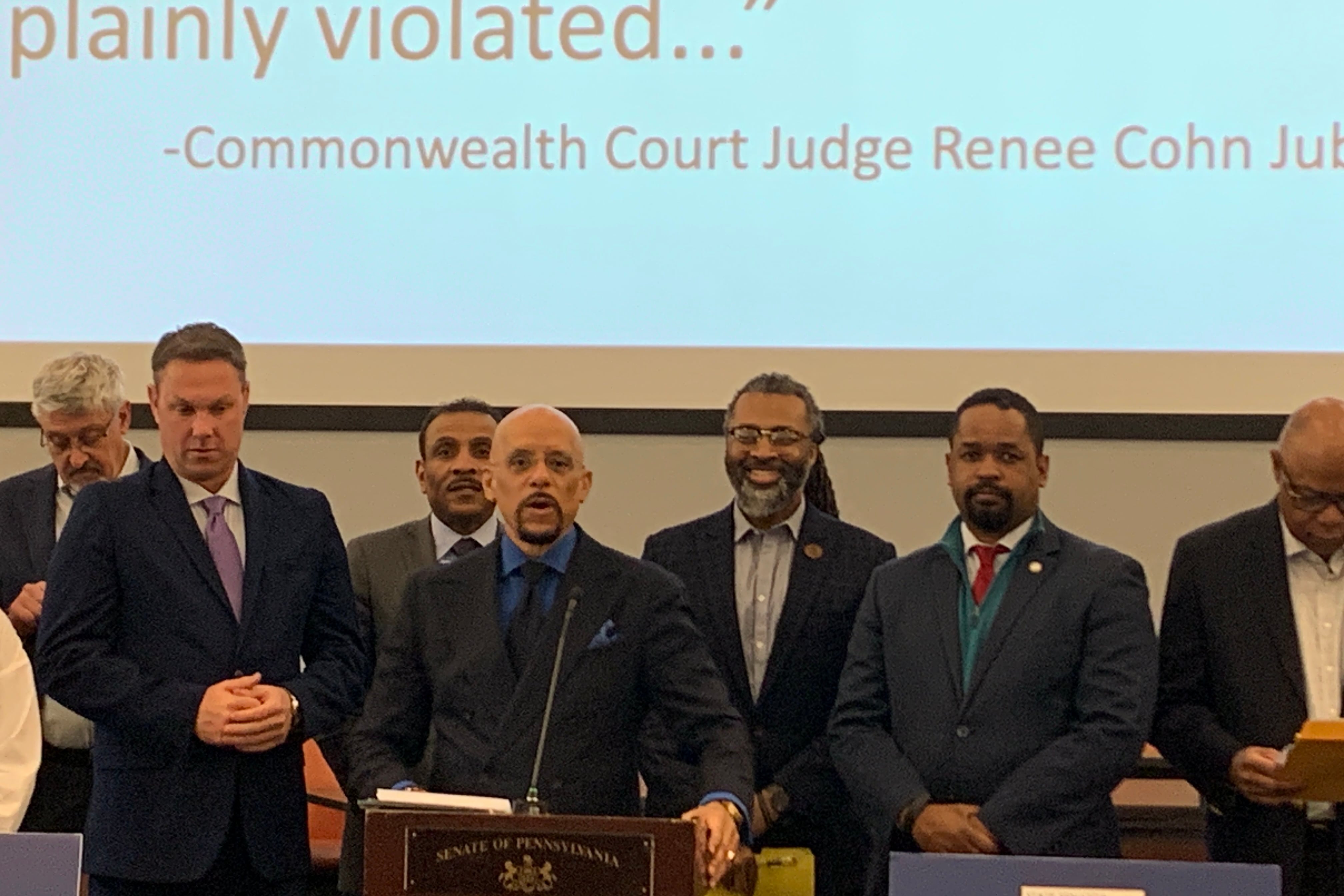A Democratic senator who oversees state spending proposed a $3.15 billion increase in education spending Thursday, saying that it is time to inaugurate “a new era” in how schools are funded.
The proposal unveiled Thursday by Sen. Vincent Hughes, the minority chair of the Senate Appropriations Committee, would mark the largest hike in state education funding ever for a single budget. In addition to a $700 million increase in basic education funding, his blueprint calls for $400 million for the 100 highest-need districts in the state, as well as targeted spending for special education, school staffing needs, student mental health, and more.
The state’s basic education funding is $7.3 billion in the current budget, while its “level up” funding for the highest-need districts is $225 million. Total general fund spending in fiscal 2023 on education is $15.4 billion; increasing that by $2.15 billion through Hughes’ plan would amount to a nearly 14% hike. The remaining $1 billion in Hughes’ proposal would be one-time funding for building repairs.
Republicans control the Pennsylvania Senate, so it remains to be seen just how much impact Hughes’ spending plan will have; Democrats control the Pennsylvania House. But his proposal, which would result in a major windfall for Philadelphia schools, comes at a potential turning point for how the state funds education. Last month, a Commonwealth Court judge ruled in a nearly decade-old school funding case that the state’s system of education funding violates the Pennsylvania Constitution, and ordered state leaders to overhaul it.
Hughes’ proposal also comes shortly before Gov. Josh Shapiro, a Democrat, is due to unveil his own budget proposal on Tuesday. As the state attorney general, Shapiro filed a brief in support of the plaintiffs in the suit, and as a candidate for governor last year said he wanted to increase K-12 spending.
Hughes, who represents Philadelphia, called his proposal a “remedy” to Commonwealth Court Judge Renée Cohn Jubelirer’s decision last month in a landmark school funding case brought by six school districts, several parents, and two civil rights groups.
This is a moment, he said, to make “historic investments in the context of a state budget that has historic surpluses … the question is whether we have the political will and the moral capability to get this done.”
In her ruling after a four-month trial, Jubelirer — a Republican — said that the wide spending gaps between wealthy and low-income school districts “is not justified by any compelling government interest nor is it rationally related to any legitimate government objective.” The resource gaps between districts in Pennsylvania rank with the widest in the country.
Hughes said the gaps can amount to more than $5,000 per student. He called the disparities a civil rights issue, since Black and brown students disproportionately reside in low-wealth districts.
The method for funding education in Pennsylvania, he said, “harkens back to the days of Jim Crow, to slavery, back to the days when it was illegal … to educate Black and brown children. Now we have the opportunity to change that.”
While the governor, Department of Education and the General Assembly were named as defendants in the case — William Penn School District et al. v. Pennsylvania Department of Education et al. — only Republican legislative leaders put up a defense in Jubelirer’s court. They argued that the current system is adequate and constitutional and that the courts should not intervene.
They have not indicated whether they intend to appeal her ruling. But they have filed a post-trial motion challenging parts of Jubelirer’s decision, a procedural step that preserves that option. The original deadline for an appeal was March 7, but due to the post-trial activity, they now will have 30 days after the judge rules on their motion.
At the event announcing his proposal, Hughes appeared alongside Philadelphia Board of Education President Reginald Streater, Philadelphia Superintendent Tony Watlington, Philadelphia Federation of Teachers President President Jerry Jordan, and other state legislators.
Philadelphia was not among the plaintiffs, but Watlington said he was “incredibly pleased” with Jubilerer’s decision. “Our students deserve those resources, we need those resources, and we know exactly what to do with those resources,” he said.
And Streater said that worthwhile reforms “never had a chance to take off due to a lack of resources … it’s clear we have an educational system in Pennsylvania that is separate and indeed unequal.”
Here are other notable elements of Hughes’ proposal:
- $275 million for the long-dormant charter school reimbursement program for districts. Such a provision would be a boon to Philadelphia, where half the state’s charter schools are located and 70,000 students attend charters.
- $250 million in additional special education aid.
- $150 million for early childhood education.
- $125 million for targeted academic supports, like summer reading programs, tutoring, and adult literacy.
- $100 million for student mental health initiatives
- $100 million for staffing needs to help schools recruit teachers and others.
Hughes also wants $1 billion for a “toxic schools remediation program.” Philadelphia’s school buildings have an average age of 70 years, with many having hazardous conditions including asbestos and lead pipes.
On Tuesday, the Philadelphia district announced that Building 21, a high school located in a former elementary school built in 1916, would close for two days this week so the district could clean up loose asbestos discovered in an auditorium and two stairwells. On Friday, officials said students and staff would relocate to Strawberry Mansion High School next week while the abatement work continues.
In addition to the money Hughes is proposing, Democratic Sen. Tim Kearney of Swarthmore, has introduced legislation that would fund PlanCon, a state program designed to build, repair and modernize school buildings. PlanCon has not been funded since 2015.
Dale Mezzacappa is a senior writer for Chalkbeat Philadelphia, where she covers K-12 schools and early childhood education in Philadelphia. Contact Dale at dmezzacappa@chalkbeat.org.







